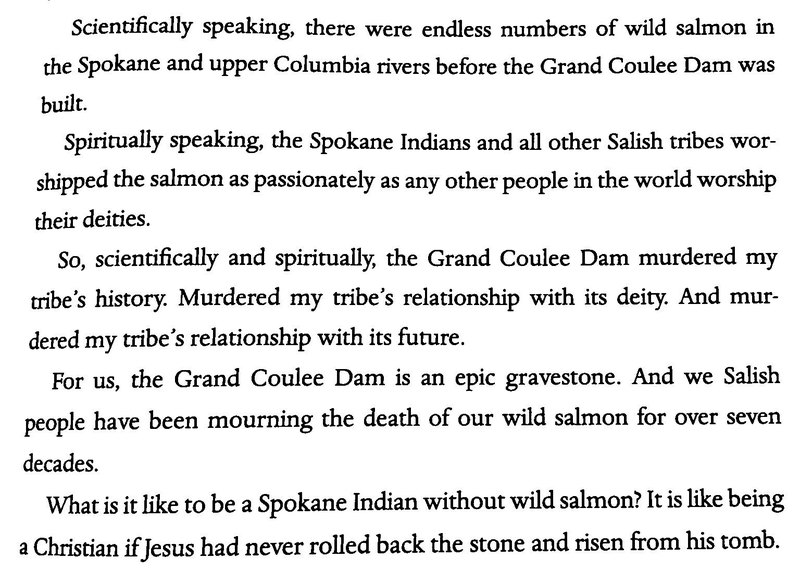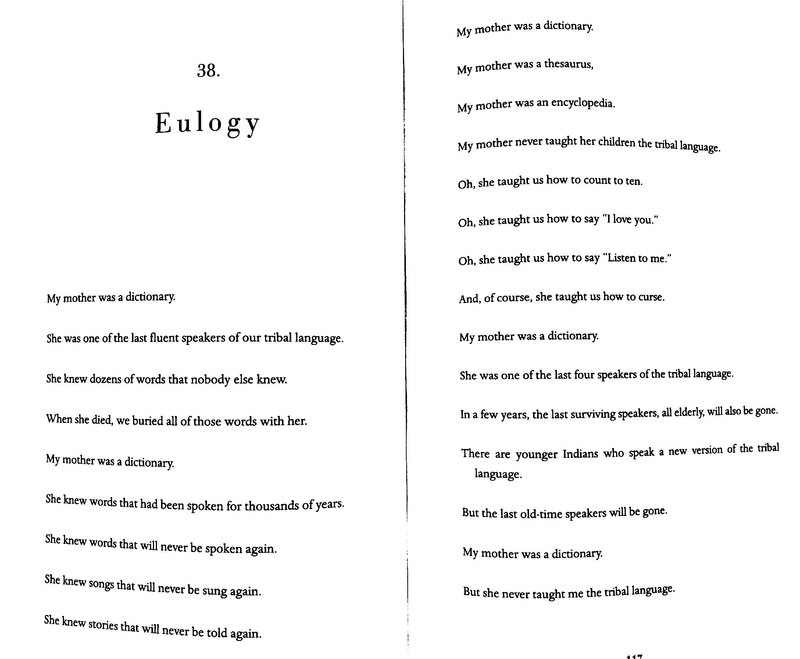Findings and Discussion
Sherman Alexie uses common Native American language features and themes to explain his connection to Spokane Indian heritage. Rather than containing phonological cues or dialectal information, You Don't Have to Say You Love Me details the nuances of Native American heritage that reflect his identity. Alexie uses naming, razzing, lamenting the loss of Spokane language, and salmon (metaphorically and literally) to identify his place in the world.
Salmon and Subsistence
Many chapters of You Don't Have to Say You Love Me focus on the cultural connections of salmon to the Spokane Indians.
"God Damn, God Dam" is an introduction to the Grand Coulee Dam's influence on the Spokane Indians.
"In July 1993, construction began on the Grand Coulee Dam. Still one of the largest concrete structures in the world, that dam submerged ancient villages and falls and eventually killed all of the wild salmon in the upper Columbia and Spokane rivers" (132).
Breinig, in his essay "Alaskan Haida Narratives: Maintaining Cultural Identity through Subsistence," argues that subsistence activities, such as fishing for and eating salmon, are some of the key components of Native cultural survival. In a comission written to Congress by Alaska Natives, they stated, "Subsistence is not just a nutritional or economic necessity; it is also cultural and spiritual sustenance on which survival of their cultures depend... To take away subsistence...is to deal the final and fatal blow to their survival as a distinct people" (Breinig 19).
Alexie refutes this claim throughout the memoir. The Spokane Indian identity is fractured without salmon. Considering the Dam was built in 1933, his argument is that the Spokane people have long been missing a fundamental piece of their identity.
In another chapter titled "C Is for Clan," Alexie writes:
"My mother and father were members of the first generation of Interior Salish people who lived entirely without wild salmon. My mother and father, without wild salmon, were spiritual orphans...My siblings and I were conceived, birthed, and nurtured by orphans - by the salmonless..." (139)
Alexie again, describes how Indians of the Pacific Northwest within the last few generations have lost a crucial element of their identity due to the death of the salmon. Natives without cultural identity seem to not be fully Native American.
In this clip, members of the Spokane tribe discuss the loss of salmon and it's impact.
Spokane Language Usage
The death of the Spokane tribal language is a recurring theme throughout You Don't Have to Say You Love Me.
"Eulogy," a poem/eulogy for his deceased mother, focuses perhaps more on the death of tribal language than the death of Alexie's mother. The poem details the ways in which his mother, Lillian, was one of the last four speakers of Spokane -- with her death, an important piece of Spokane heritage disappeared.
Alexie mourns the loss of the Spokane language, noting that he could have learned the language from his mother, but never asked. When she died, him and his siblings mourned her in English. He also repeats twice that his mother told him, "'English will be your best weapon.'" Alexie is aware that she was correct, as his profession and identity are found in writing, yet he seems to grapple with the lack of ability to speak - and write in - the language that his ancestors spoke for thousands of years. Writing in English is definitive of Alexie, but he also defines himself as a Spokane Indian who cannot speak the Spokane language.
Similarly, in "The Loss Extends in All Directions," Alexie shares how at dinner after burying their mother, his brothers and cousins are eating when his brother asks the Spokane word for salmon. Salmon is integral to Spokane culture, and the Spokane word for it is now never to be known by them. The death of salmon, death of Spokane language, and death of Lillian Alexie, one of the last speakers of Spokane are all intimately connected, representing the loss of heritage felt by Alexie and his family.
Naming
Naming is seen multiple times throughout Alexie's memoir. While it normally seems like a stereotypical mode of mocking Native Americans, Alexie uses jocular naming affectionately and reverently. Naming is interwoven into the cultures of American Indians, and Alexie uses it as a mode of defining himself and others, and their places in the world.
Alexie begins the naming by sharing the history of his grandmother in "End of Life." He shares that she was a six-foot-tall matriarchal figure in the Spokane tribe, "famous in the Indian world for her spiritual power--for her ancient stories and songs" (45). Alexie shares that "everybody called her Big Mom," and though he mentions her birth name briefly, it is only mentioned this once throughout the entire memoire. "Big Mom" is used multiple times, showing the importance of her "tribe-given" name - it is a name she came to earn with age and defined her identity within the community.
In "Scatalogical," Alexie shares two characteristics for which he is well-known: crying and defecating. Therefore, his friends brand him "Thunder Tears," and his siblings call him "Dairy Queen" for unmentionable reasons. Although this information is irrelevant to the rest of the chapter which deals with his mother's funeral, Alexie shares the names he has affectionately and hilariously received. His self-identity and others perceptions of him are found in part through these names (67).
In "Feast," Alexie describes the food eaten after his mother's funeral at a feast in a tribal longhouse. When Alexie asks a cousin if the deer they're eating was hunted by him, his cousin affirms and tells Sherman to tag along in the future. Both men immediately laugh, and his cousin jokes, "Little Sherm the Great Indian Hunter! (112)" No words besides the name is needed to convey their opinions on this proposition.
In "Rebel Without a Clause," Alexie begins by stating, "I am Sherman Joseph Alexie, Jr., and I have always struggled with being the second of my name" (123). His given name is presented, followed by a grievance at being known as Junior (still) by his friends and family. He feels being named after someone else "lacks gravitas," and at a young age, decided to spell Junior as Juniour. "I will spell my name the way I want to spell my name," he states, giving himself autonomy over the way he is presented to others (125). In this same chapter, Alexie dubs his mom "Lillian the Cruel," and although he does not explain it here, from other chapters describing his and his mother's strained relationship, readers understand why. Alexie participates in naming just as others do, and follows a formula which we see repeated in a few other scenarios: Given Name + the + Descriptive Title. It's interesting to note that this name for his mother is almost certainly not one he would have shared with her while she was living, and yet feels it essential to describing her identity to him.
In "C is for Clan," he shares the story of a Navajo woman asking his clan name and Indian name. He doesn't tell her, but instead tells readers, "My name is Sherman Alexie. Yes I have an Indian name. But I ain't going to share it with you. I learned a long time ago that the only way to keep something sacred is to keep it private" (141). Alexie has not shared with us his "Indian name," if he does have one, showing that he does revere the sacredness, and simultaneously showing us that what others name him or think of him is for them to decide.
Razzing
Razzing is closely intertwined with naming. When Alexie mentions the names given to him and the names he gives others, they always have a humorous or self-depricating undertone. Carmen Fought describes razzing as "one of the practices crucial to being a 'Real Indian'... a type of verbal sparring...which may include metaphors as part of the humor" (164).
Alexie mentions his nicknames of "Dairy Queen" and "Thunder Tears" in the chapter "Scatalogical." Each of these nicknames are a form of razzing, given to him in a jocular fashion, which liken him to inanimate objects. Alexie is not at all offended by this - razzing is a signal of ingroup membership, and can perhaps be a display of intimacy and closeness. Only those who are close with each other can engage in verbal sparring and know that it will not be misconstrued to be offensive.
We also see razzing in "Feast," when his cousin deems Alexie "Little Sherm the Great Indian Hunter." This comment is understood to be both humorous and sarcastic - Alexie notes that his bad back and lack of practical hunting skills would never allow him to be a hunter as his cousin is. Both men have this prior context and familial intimacy, and therefore Sherman can be 'razzed.'
An example of a failed attempt at razzing is seen in "Clotheshorse." An acquaintance approaches Alexie at his mother's funeral and says, "Your shirt is wrinkled" (Alexie 93). Alexie is instantly angry.
- "...I suppose he though that he'd burned me with his quick wit. We Spokane Indians are famous for our verbal cruelty. I'd been trained from an early age to fire insults like arrows." (93)
This excerpt exemplifies that "verbal cruelty" is cultivated within Alexie's tribe, and he can respond and engage in the aforementioned verbal sparring if he so pleases. However, it is clear that these two men are not close and Alexie is not interested in playing nice if he's going to respond. While the other man may have been hoping that this "joke" would have had a different outcome, razzing requires the participant to accept the jab. Another interesting element of this comment is that Alexie equates verbal weaponry with Native American weaponry - the arrow. He shows us that verbal wit is a better marker of heritage and culture than the stereotypical arrow image.



